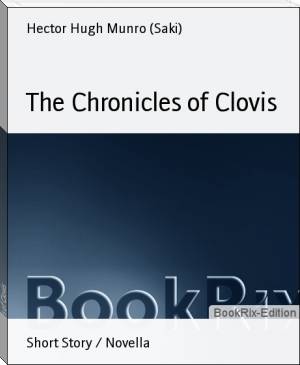Beasts and Super-Beasts - Hector Hugh Munro (Saki) (paper ebook reader TXT) 📗

- Author: Hector Hugh Munro (Saki)
Book online «Beasts and Super-Beasts - Hector Hugh Munro (Saki) (paper ebook reader TXT) 📗». Author Hector Hugh Munro (Saki)
anyone could extract gold from an unpromising situation it would certainly be Vasco - of course, under the necessary safeguards in the way of supervision. Where money was in question Vasco's conscience was liable to fits of obstinate silence.
Somewhere on the west coast of Ireland the Dulverton property included a few acres of shingle, rock, and heather, too barren to support even an agrarian outrage, but embracing a small and fairly deep bay where the lobster yield was good in most seasons. There was a bleak little house on the property, and for those who liked lobsters and solitude, and were able to accept an Irish cook's ideas as to what might be perpetrated in the name of mayonnaise, Innisgluther was a tolerable exile during the summer months. Lulu seldom went there herself, but she lent the house lavishly to friends and relations. She put it now at Vasco's disposal.
"It will be the very place to practise and experiment with the salvage apparatus," she said; "the bay is quite deep in places, and you will be able to test everything thoroughly before starting on the treasure hunt."
In less than three weeks Vasco turned up in town to report progress.
"The apparatus works beautifully," he informed his aunt; "the deeper one got the clearer everything grew. We found something in the way of a sunken wreck to operate on, too!"
"A wreck in Innisgluther Bay!" exclaimed Lulu.
"A submerged motor-boat, the Sub-Rosa ," said Vasco.
"No! really?" said Lulu; "poor Billy Yuttley's boat. I remember it went down somewhere off that coast some three years ago. His body was washed ashore at the Point. People said at the time that the boat was capsized intentionally - a case of suicide, you know. People always say that sort of thing when anything tragic happens."
"In this case they were right," said Vasco.
"What do you mean?" asked the Duchess hurriedly. "What makes you think so?"
"I know," said Vasco simply.
"Know? How can you know? How can anyone know? The thing happened three years ago."
"In a locker of the Sub-Rosa I found a water-tight strong-box. It contained papers." Vasco paused with dramatic effect and searched for a moment in the inner breast-pocket of his coat. He drew out a folded slip of paper. The Duchess snatched at it in almost indecent haste and moved appreciably nearer the fireplace.
"Was this in the Sub-Rosa's strong-box?" she asked.
"Oh no," said Vasco carelessly, "that is a list of the well-known people who would be involved in a very disagreeable scandal if the Sub-Rosa's papers were made public. I've put you at the head of it, otherwise it follows alphabetical order."
The Duchess gazed helplessly at the string of names, which seemed for the moment to include nearly every one she knew. As a matter of fact, her own name at the head of the list exercised an almost paralysing effect on her thinking faculties.
"Of course you have destroyed the papers?" she asked, when she had somewhat recovered herself. She was conscious that she made the remark with an entire lack of conviction.
Vasco shook his head.
"But you should have," said Lulu angrily; "if, as you say, they are highly compromising - "
"Oh, they are, I assure you of that," interposed the young man.
"Then you should put them out of harm's way at once. Supposing anything should leak out, think of all these poor, unfortunate people who would be involved in the disclosures," and Lulu tapped the list with an agitated gesture.
"Unfortunate, perhaps, but not poor," corrected Vasco; "if you read the list carefully you'll notice that I haven't troubled to include anyone whose financial standing isn't above question."
Lulu glared at her nephew for some moments in silence. Then she asked hoarsely: "What are you going to do?"
"Nothing - for the remainder of my life," he answered meaningly. "A little hunting, perhaps," he continued, "and I shall have a villa at Florence. The Villa Sub-Rosa would sound rather quaint and picturesque, don't you think, and quite a lot of people would be able to attach a meaning to the name. And I suppose I must have a hobby; I shall probably collect Raeburns."
Lulu's relative, who lived at the Court of Monaco, got quite a snappish answer when she wrote recommending some further invention in the realm of marine research.
THE COBWEB
The farmhouse kitchen probably stood where it did as a matter of accident or haphazard choice; yet its situation might have been planned by a master-strategist in farmhouse architecture. Dairy and poultry-yard, and herb garden, and all the busy places of the farm seemed to lead by easy access into its wide flagged haven, where there was room for everything and where muddy boots left traces that were easily swept away. And yet, for all that it stood so well in the centre of human bustle, its long, latticed window, with the wide window-seat, built into an embrasure beyond the huge fireplace, looked out on a wild spreading view of hill and heather and wooded combe. The window nook made almost a little room in itself, quite the pleasantest room in the farm as far as situation and capabilities went. Young Mrs. Ladbruk, whose husband had just come into the farm by way of inheritance, cast covetous eyes on this snug corner, and her fingers itched to make it bright and cosy with chintz curtains and bowls of flowers, and a shelf or two of old china. The musty farm parlour, looking out on to a prim, cheerless garden imprisoned within high, blank walls, was not a room that lent itself readily either to comfort or decoration.
"When we are more settled I shall work wonders in the way of making the kitchen habitable," said the young woman to her occasional visitors. There was an unspoken wish in those words, a wish which was unconfessed as well as unspoken. Emma Ladbruk was the mistress of the farm; jointly with her husband she might have her say, and to a certain extent her way, in ordering its affairs. But she was not mistress of the kitchen.
On one of the shelves of an old dresser, in company with chipped sauce- boats, pewter jugs, cheese-graters, and paid bills, rested a worn and ragged Bible, on whose front page was the record, in faded ink, of a baptism dated ninety-four years ago. "Martha Crale" was the name written on that yellow page. The yellow, wrinkled old dame who hobbled and muttered about the kitchen, looking like a dead autumn leaf which the winter winds still pushed hither and thither, had once been Martha Crale; for seventy odd years she had been Martha Mountjoy. For longer than anyone could remember she had pattered to and fro between oven and wash- house and dairy, and out to chicken-run and garden, grumbling and muttering and scolding, but working unceasingly. Emma Ladbruk, of whose coming she took as little notice as she would of a bee wandering in at a window on a summer's day, used at first to watch her with a kind of frightened curiosity. She was so old and so much a part of the place, it was difficult to think of her exactly as a living thing. Old Shep, the white-nozzled, stiff-limbed collie, waiting for his time to die, seemed almost more human than the withered, dried-up old woman. He had been a riotous, roystering puppy, mad with the joy of life, when she was already a tottering, hobbling dame; now he was just a blind, breathing carcase, nothing more, and she still worked with frail energy, still swept and baked and washed, fetched and carried. If there were something in these wise old dogs that did not perish utterly with death, Emma used to think to herself, what generations of ghost-dogs there must be out on those hills, that Martha had reared and fed and tended and spoken a last good- bye word to in that old kitchen. And what memories she must have of human generations that had passed away in her time. It was difficult for anyone, let alone a stranger like Emma, to get her to talk of the days that had been; her shrill, quavering speech was of doors that had been left unfastened, pails that had got mislaid, calves whose feeding-time was overdue, and the various little faults and lapses that chequer a farmhouse routine. Now and again, when election time came round, she would unstore her recollections of the old names round which the fight had waged in the days gone by. There had been a Palmerston, that had been a name down Tiverton way; Tiverton was not a far journey as the crow flies, but to Martha it was almost a foreign country. Later there had been Northcotes and Aclands, and many other newer names that she had forgotten; the names changed, but it was always Libruls and Toories, Yellows and Blues. And they always quarrelled and shouted as to who was right and who was wrong. The one they quarrelled about most was a fine old gentleman with an angry face - she had seen his picture on the walls. She had seen it on the floor too, with a rotten apple squashed over it, for the farm had changed its politics from time to time. Martha had never been on one side or the other; none of "they" had ever done the farm a stroke of good. Such was her sweeping verdict, given with all a peasant's distrust of the outside world.
When the half-frightened curiosity had somewhat faded away, Emma Ladbruk was uncomfortably conscious of another feeling towards the old woman. She was a quaint old tradition, lingering about the place, she was part and parcel of the farm itself, she was something at once pathetic and picturesque - but she was dreadfully in the way. Emma had come to the farm full of plans for little reforms and improvements, in part the result of training in the newest ways and methods, in part the outcome of her own ideas and fancies. Reforms in the kitchen region, if those deaf old ears could have been induced to give them even a hearing, would have met with short shrift and scornful rejection, and the kitchen region spread over the zone of dairy and market business and half the work of the household. Emma, with the latest science of dead-poultry dressing at her finger-tips, sat by, an unheeded watcher, while old Martha trussed the chickens for the market-stall as she had trussed them for nearly fourscore years - all leg and no breast. And the hundred hints anent effective cleaning and labour-lightening and the things that make for wholesomeness which the young woman was ready to impart or to put into action dropped away into nothingness before that wan, muttering, unheeding presence. Above all, the coveted window corner, that was to be a dainty, cheerful oasis in the gaunt old kitchen, stood now choked and lumbered with a litter of odds and ends that Emma, for all her nominal authority, would not have dared or cared to displace; over them seemed to be spun the protection of something that was like a human cobweb. Decidedly Martha was in the way. It would have been an unworthy meanness to have wished to see the
Somewhere on the west coast of Ireland the Dulverton property included a few acres of shingle, rock, and heather, too barren to support even an agrarian outrage, but embracing a small and fairly deep bay where the lobster yield was good in most seasons. There was a bleak little house on the property, and for those who liked lobsters and solitude, and were able to accept an Irish cook's ideas as to what might be perpetrated in the name of mayonnaise, Innisgluther was a tolerable exile during the summer months. Lulu seldom went there herself, but she lent the house lavishly to friends and relations. She put it now at Vasco's disposal.
"It will be the very place to practise and experiment with the salvage apparatus," she said; "the bay is quite deep in places, and you will be able to test everything thoroughly before starting on the treasure hunt."
In less than three weeks Vasco turned up in town to report progress.
"The apparatus works beautifully," he informed his aunt; "the deeper one got the clearer everything grew. We found something in the way of a sunken wreck to operate on, too!"
"A wreck in Innisgluther Bay!" exclaimed Lulu.
"A submerged motor-boat, the Sub-Rosa ," said Vasco.
"No! really?" said Lulu; "poor Billy Yuttley's boat. I remember it went down somewhere off that coast some three years ago. His body was washed ashore at the Point. People said at the time that the boat was capsized intentionally - a case of suicide, you know. People always say that sort of thing when anything tragic happens."
"In this case they were right," said Vasco.
"What do you mean?" asked the Duchess hurriedly. "What makes you think so?"
"I know," said Vasco simply.
"Know? How can you know? How can anyone know? The thing happened three years ago."
"In a locker of the Sub-Rosa I found a water-tight strong-box. It contained papers." Vasco paused with dramatic effect and searched for a moment in the inner breast-pocket of his coat. He drew out a folded slip of paper. The Duchess snatched at it in almost indecent haste and moved appreciably nearer the fireplace.
"Was this in the Sub-Rosa's strong-box?" she asked.
"Oh no," said Vasco carelessly, "that is a list of the well-known people who would be involved in a very disagreeable scandal if the Sub-Rosa's papers were made public. I've put you at the head of it, otherwise it follows alphabetical order."
The Duchess gazed helplessly at the string of names, which seemed for the moment to include nearly every one she knew. As a matter of fact, her own name at the head of the list exercised an almost paralysing effect on her thinking faculties.
"Of course you have destroyed the papers?" she asked, when she had somewhat recovered herself. She was conscious that she made the remark with an entire lack of conviction.
Vasco shook his head.
"But you should have," said Lulu angrily; "if, as you say, they are highly compromising - "
"Oh, they are, I assure you of that," interposed the young man.
"Then you should put them out of harm's way at once. Supposing anything should leak out, think of all these poor, unfortunate people who would be involved in the disclosures," and Lulu tapped the list with an agitated gesture.
"Unfortunate, perhaps, but not poor," corrected Vasco; "if you read the list carefully you'll notice that I haven't troubled to include anyone whose financial standing isn't above question."
Lulu glared at her nephew for some moments in silence. Then she asked hoarsely: "What are you going to do?"
"Nothing - for the remainder of my life," he answered meaningly. "A little hunting, perhaps," he continued, "and I shall have a villa at Florence. The Villa Sub-Rosa would sound rather quaint and picturesque, don't you think, and quite a lot of people would be able to attach a meaning to the name. And I suppose I must have a hobby; I shall probably collect Raeburns."
Lulu's relative, who lived at the Court of Monaco, got quite a snappish answer when she wrote recommending some further invention in the realm of marine research.
THE COBWEB
The farmhouse kitchen probably stood where it did as a matter of accident or haphazard choice; yet its situation might have been planned by a master-strategist in farmhouse architecture. Dairy and poultry-yard, and herb garden, and all the busy places of the farm seemed to lead by easy access into its wide flagged haven, where there was room for everything and where muddy boots left traces that were easily swept away. And yet, for all that it stood so well in the centre of human bustle, its long, latticed window, with the wide window-seat, built into an embrasure beyond the huge fireplace, looked out on a wild spreading view of hill and heather and wooded combe. The window nook made almost a little room in itself, quite the pleasantest room in the farm as far as situation and capabilities went. Young Mrs. Ladbruk, whose husband had just come into the farm by way of inheritance, cast covetous eyes on this snug corner, and her fingers itched to make it bright and cosy with chintz curtains and bowls of flowers, and a shelf or two of old china. The musty farm parlour, looking out on to a prim, cheerless garden imprisoned within high, blank walls, was not a room that lent itself readily either to comfort or decoration.
"When we are more settled I shall work wonders in the way of making the kitchen habitable," said the young woman to her occasional visitors. There was an unspoken wish in those words, a wish which was unconfessed as well as unspoken. Emma Ladbruk was the mistress of the farm; jointly with her husband she might have her say, and to a certain extent her way, in ordering its affairs. But she was not mistress of the kitchen.
On one of the shelves of an old dresser, in company with chipped sauce- boats, pewter jugs, cheese-graters, and paid bills, rested a worn and ragged Bible, on whose front page was the record, in faded ink, of a baptism dated ninety-four years ago. "Martha Crale" was the name written on that yellow page. The yellow, wrinkled old dame who hobbled and muttered about the kitchen, looking like a dead autumn leaf which the winter winds still pushed hither and thither, had once been Martha Crale; for seventy odd years she had been Martha Mountjoy. For longer than anyone could remember she had pattered to and fro between oven and wash- house and dairy, and out to chicken-run and garden, grumbling and muttering and scolding, but working unceasingly. Emma Ladbruk, of whose coming she took as little notice as she would of a bee wandering in at a window on a summer's day, used at first to watch her with a kind of frightened curiosity. She was so old and so much a part of the place, it was difficult to think of her exactly as a living thing. Old Shep, the white-nozzled, stiff-limbed collie, waiting for his time to die, seemed almost more human than the withered, dried-up old woman. He had been a riotous, roystering puppy, mad with the joy of life, when she was already a tottering, hobbling dame; now he was just a blind, breathing carcase, nothing more, and she still worked with frail energy, still swept and baked and washed, fetched and carried. If there were something in these wise old dogs that did not perish utterly with death, Emma used to think to herself, what generations of ghost-dogs there must be out on those hills, that Martha had reared and fed and tended and spoken a last good- bye word to in that old kitchen. And what memories she must have of human generations that had passed away in her time. It was difficult for anyone, let alone a stranger like Emma, to get her to talk of the days that had been; her shrill, quavering speech was of doors that had been left unfastened, pails that had got mislaid, calves whose feeding-time was overdue, and the various little faults and lapses that chequer a farmhouse routine. Now and again, when election time came round, she would unstore her recollections of the old names round which the fight had waged in the days gone by. There had been a Palmerston, that had been a name down Tiverton way; Tiverton was not a far journey as the crow flies, but to Martha it was almost a foreign country. Later there had been Northcotes and Aclands, and many other newer names that she had forgotten; the names changed, but it was always Libruls and Toories, Yellows and Blues. And they always quarrelled and shouted as to who was right and who was wrong. The one they quarrelled about most was a fine old gentleman with an angry face - she had seen his picture on the walls. She had seen it on the floor too, with a rotten apple squashed over it, for the farm had changed its politics from time to time. Martha had never been on one side or the other; none of "they" had ever done the farm a stroke of good. Such was her sweeping verdict, given with all a peasant's distrust of the outside world.
When the half-frightened curiosity had somewhat faded away, Emma Ladbruk was uncomfortably conscious of another feeling towards the old woman. She was a quaint old tradition, lingering about the place, she was part and parcel of the farm itself, she was something at once pathetic and picturesque - but she was dreadfully in the way. Emma had come to the farm full of plans for little reforms and improvements, in part the result of training in the newest ways and methods, in part the outcome of her own ideas and fancies. Reforms in the kitchen region, if those deaf old ears could have been induced to give them even a hearing, would have met with short shrift and scornful rejection, and the kitchen region spread over the zone of dairy and market business and half the work of the household. Emma, with the latest science of dead-poultry dressing at her finger-tips, sat by, an unheeded watcher, while old Martha trussed the chickens for the market-stall as she had trussed them for nearly fourscore years - all leg and no breast. And the hundred hints anent effective cleaning and labour-lightening and the things that make for wholesomeness which the young woman was ready to impart or to put into action dropped away into nothingness before that wan, muttering, unheeding presence. Above all, the coveted window corner, that was to be a dainty, cheerful oasis in the gaunt old kitchen, stood now choked and lumbered with a litter of odds and ends that Emma, for all her nominal authority, would not have dared or cared to displace; over them seemed to be spun the protection of something that was like a human cobweb. Decidedly Martha was in the way. It would have been an unworthy meanness to have wished to see the
Free e-book «Beasts and Super-Beasts - Hector Hugh Munro (Saki) (paper ebook reader TXT) 📗» - read online now
Similar e-books:





Comments (0)